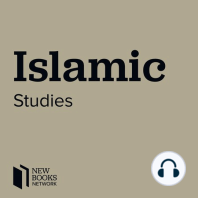62 min listen

Majid Daneshgar, "Studying the Qur’an in the Muslim Academy" (Oxford UP, 2019)
Majid Daneshgar, "Studying the Qur’an in the Muslim Academy" (Oxford UP, 2019)
ratings:
Length:
41 minutes
Released:
Sep 15, 2020
Format:
Podcast episode
Description
“Consider the works of the renowned Nobel-prize-winning African American writer, literary and social critic, and activist Toni Morrison (b. 1931),” writes Majid Daneshgar. “Hers—like Said’s—are popular in the West and cover most of the principal themes covered by Orientalism, including otherness, outsider-ship, exploitation and cultural colonialism and imperialism. Yet … one would be hard-pressed to find, for instance, even a free publisher’s copy of Morrison’s essay The Origin of Others, in translation or not, on the bookshelf of one of the Muslim academy’s experts on Islam or history, or politics, or sociology.”
With this provocative introductory passage to set the stage for his book, Studying the Qur’an in the Muslim Academy (Oxford University Press), Majid Daneshgar invites his readers on a journey exploring how the Muslim academy—that is, academic institutions in the Muslim-majority world—teaches Islamic Studies, with an emphasis on the Qur’an.
Through his personal experience and scholarly endeavors spanning Southeast Asia, the Middle East, and Europe, Daneshgar illuminates how Qur’anic and Islamic Studies in the Muslim academy are inevitably circumscribed and delimited by political and polemical agendas—with special attention paid to how Edward Said’s Orientalism is marshaled toward these effort—thus offering only selective readings of the Qur’anic text and wider Islamic source material.
In addition, he also shows how such agendas even color intra-Muslim engagement across sectarian and national lines. Daneshgar offers alternative approaches—drawing from both theory and philology—and argues that bringing theories and methods from both the Western academy and the Muslim academy into more constructive dialogue with each other will advance—not hinder—intellectual and public engagement with Islam and the Qur’an. In our increasingly global and interconnected world, we can settle for no less.
Majid Daneshgar, Ph.D. is a Research Associate at the Orientalisches Seminar, University of Freiburg, Germany.
Asad Dandia is a graduate student of Islamic Studies at Columbia University.
Learn more about your ad choices. Visit megaphone.fm/adchoices
Support our show by becoming a premium member! https://newbooksnetwork.supportingcast.fm/islamic-studies
With this provocative introductory passage to set the stage for his book, Studying the Qur’an in the Muslim Academy (Oxford University Press), Majid Daneshgar invites his readers on a journey exploring how the Muslim academy—that is, academic institutions in the Muslim-majority world—teaches Islamic Studies, with an emphasis on the Qur’an.
Through his personal experience and scholarly endeavors spanning Southeast Asia, the Middle East, and Europe, Daneshgar illuminates how Qur’anic and Islamic Studies in the Muslim academy are inevitably circumscribed and delimited by political and polemical agendas—with special attention paid to how Edward Said’s Orientalism is marshaled toward these effort—thus offering only selective readings of the Qur’anic text and wider Islamic source material.
In addition, he also shows how such agendas even color intra-Muslim engagement across sectarian and national lines. Daneshgar offers alternative approaches—drawing from both theory and philology—and argues that bringing theories and methods from both the Western academy and the Muslim academy into more constructive dialogue with each other will advance—not hinder—intellectual and public engagement with Islam and the Qur’an. In our increasingly global and interconnected world, we can settle for no less.
Majid Daneshgar, Ph.D. is a Research Associate at the Orientalisches Seminar, University of Freiburg, Germany.
Asad Dandia is a graduate student of Islamic Studies at Columbia University.
Learn more about your ad choices. Visit megaphone.fm/adchoices
Support our show by becoming a premium member! https://newbooksnetwork.supportingcast.fm/islamic-studies
Released:
Sep 15, 2020
Format:
Podcast episode
Titles in the series (100)
Lesley Hazleton, “After the Prophet: The Epic Story of the Shia-Sunni Split” (Doubleday, 2009): Sometimes a shallow explanation, the kind you read in newspapers and hear on television, is enough. “The home team was beaten at the buzzer” is probably all you need to know. Sometimes, however, it’s not. The intermittent conflict between the Shias and... by New Books in Islamic Studies